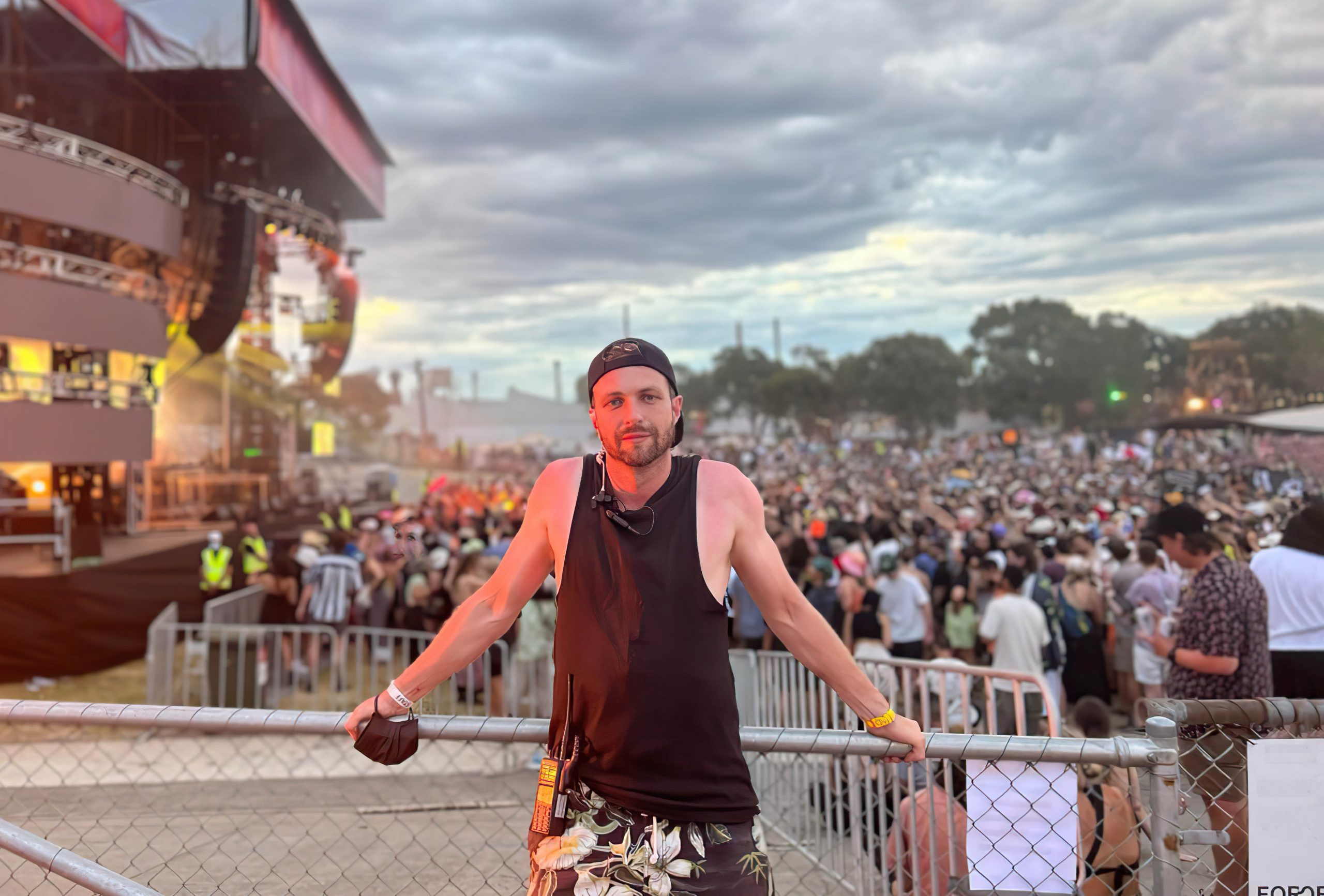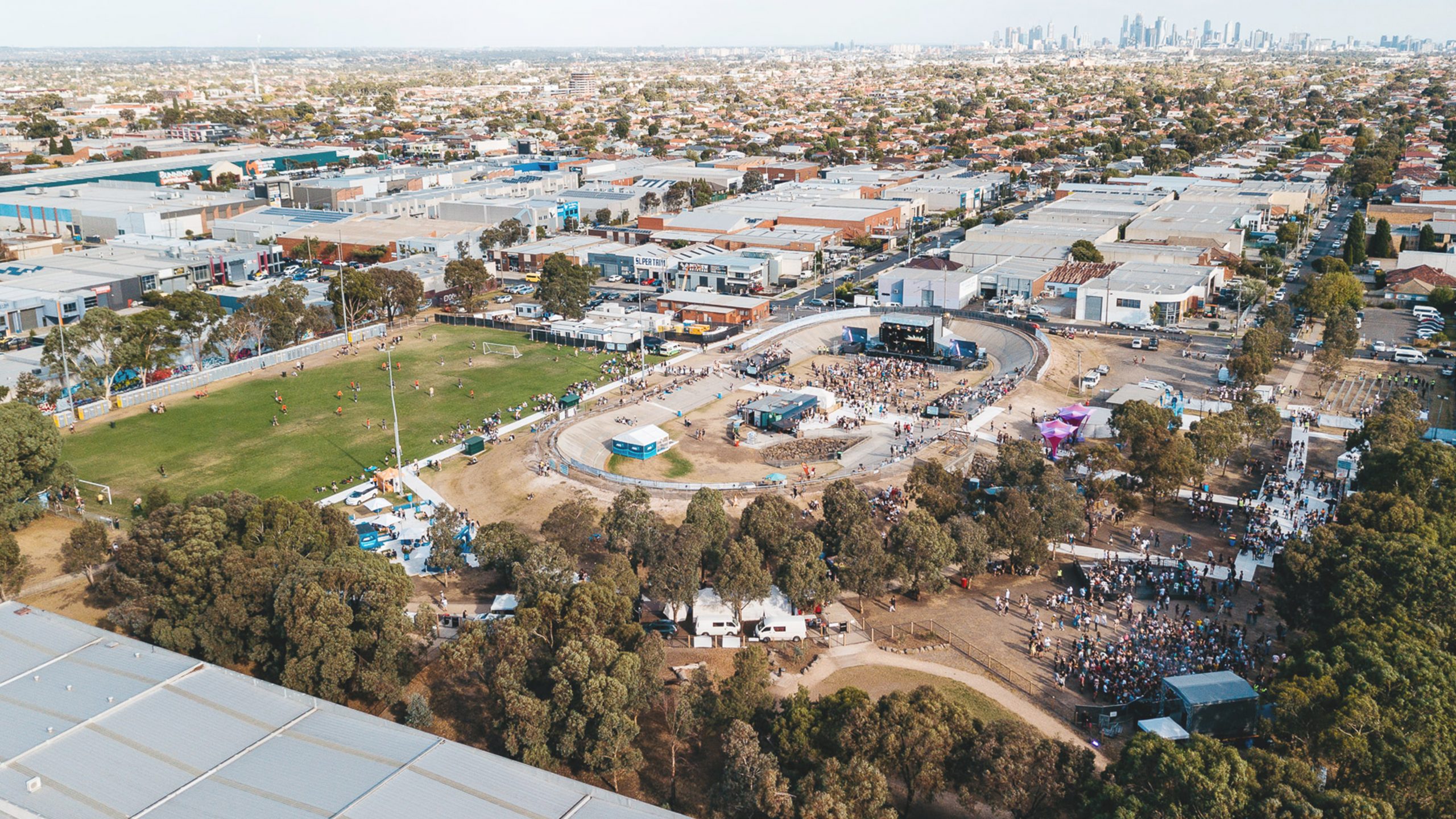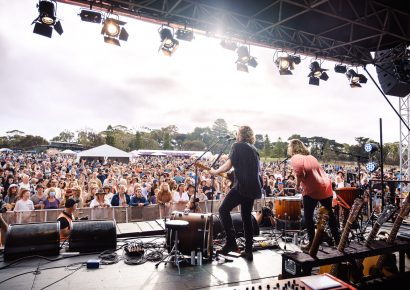Velodrome Events director Chris Mitchell shares his insights on what makes the perfect music festival, and how to make Melbourne festivals more accessible, inclusive and sustainable.
Music festivals are part of the lifeblood of Melbourne. They inject vitality, creativity, boldness and spirit into the numerous spaces and communities within our city. They provide a space in which inhibitions are cast aside – allowing all individuals to embrace their full selves and to connect on a deeper, transcendental level.
Music festivals are also a place where we find solidarity with others on the issues that matter. Great music festivals are passionate about social and cultural change as well as building open-minded and safe communities. At the heart of this are inclusivity, accessibility and sustainability.
Velodrome Events, a Melbourne independent event production company, have produced many innovative and thrilling festivals since 2016, including Freedom Time, Momo Fest, Gizzfest, Ability Fest, Duke Street Block Party, Ride In Cinema, Future Dreaming, Luft, Claptone, Dom Dolla and Sun Cycle. Velodrome Events have been also inspired by international festivals who are all strongly committed to accessibility, inclusivity and sustainability, such as Melt! festival in Germany, We Out Here by Gilles Peterson in Cambridgeshire, and Shambhala Music Festival in Canada, but are focused on creating an inimitable Melbourne-centric style.
Keep up with the latest music news, features, festivals, interviews and reviews here.
Inclusivity and accessibility
Ability Fest 2019 from Dylan Alcott Foundation on Vimeo.
An inclusive and accessible festival is for people of all races, ethnicities, gender identities, sexual orientations and abilities. Music festivals should be accessible to people living with paraplegia, cerebral palsy, muscular dystrophy and epilepsy; the deaf and blind communities; and people living with non-physical and sensory disabilities, such as autism and Asperger’s. Nothing should be deemed impossible in the context of producing festivals.
In 2018, Velodrome Events helped produce and launch Australia’s first fully inclusive and accessible music festival, Ability Fest, which was created by Dylan Alcott – the tennis champion, paralympian, media commentator, disability advocate and 2022 Australian of the Year. In 2018 and 2019, Ability Fest was held at the Coburg Velodrome, which was transformed into a completely accessible venue with the inclusion of elevated platforms, pathways and flooring, a dedicated sensory area, quiet zones, companion ticketing, ramps, AUSLAN interpreters, disabled bathrooms and Marveloo (mobile accessible restrooms), highly visible signage, Guide Dog relief and water bowls, disabled parking and drop off zone, and hundreds of volunteers to assist.
“The Ability Fest shows at the Velodrome were something we were very proud of and instrumental in changing the paradigm of what a music festival looks like,” says Chris Mitchell, director of Velodrome Events. “We were very fortunate to be involved in producing and launching the Ability Fest for the Dylan Alcott Foundation with Untitled Group. Through that we’ve learned a great deal about accessibility considerations for producing a music festival and have adopted that philosophy into what we do now and making sure we go above and beyond to make sure that patrons feel included in an event.”
Sustainability
View this post on Instagram
A sustainable festival makes important changes to improve their environmental performance regarding energy use, packaging, waste and transport. A sustainable festival stands in solidarity with and amplifies the voices of First Nations peoples who have protected the land for tens of thousands of years. It is vital that music festivals include the musical, creative and spiritual offerings of First Nations artists.
A good example of using festivals to initiate societal change was Coburg Velodrome’s innovative Future Dreaming event pre-Covid – a celebration of 80,000 years of Blak history – which encouraged participants to vote in the First Peoples’ Assembly of Victoria election with a First Nations music festival lineup that also featured free food trucks, games and activities and dance performances. Velodrome Events was one of six Victorian-based music businesses – alongside Unified Music Group, Brunswick Ballroom, Foreign Brothers, Corner Hotel Group and Music Victoria – to participate in Green Music Australia’s inaugural business sustainability initiative, the Green Action Program (GAP). The 11-week program has been designed to help Australian music organisations understand, monitor and improve their environmental impact, and is supported by strategic partners, iSystain, and the Australian Government through the Australian Council for the Arts and the Yarra City Council.
“We sat on a panel with Green Music Australia as an introduction through COVID and the grants system, and that’s been very beneficial to us,” says Mitchell. “We’ve learned a lot about how to improve sustainability in festivals and to able to consult with that panel was really great. We would’ve never had the opportunity of meeting these people if it weren’t for COVID and the solidarity that COVID sort of brought, and we’re proud of that as well.”
Location
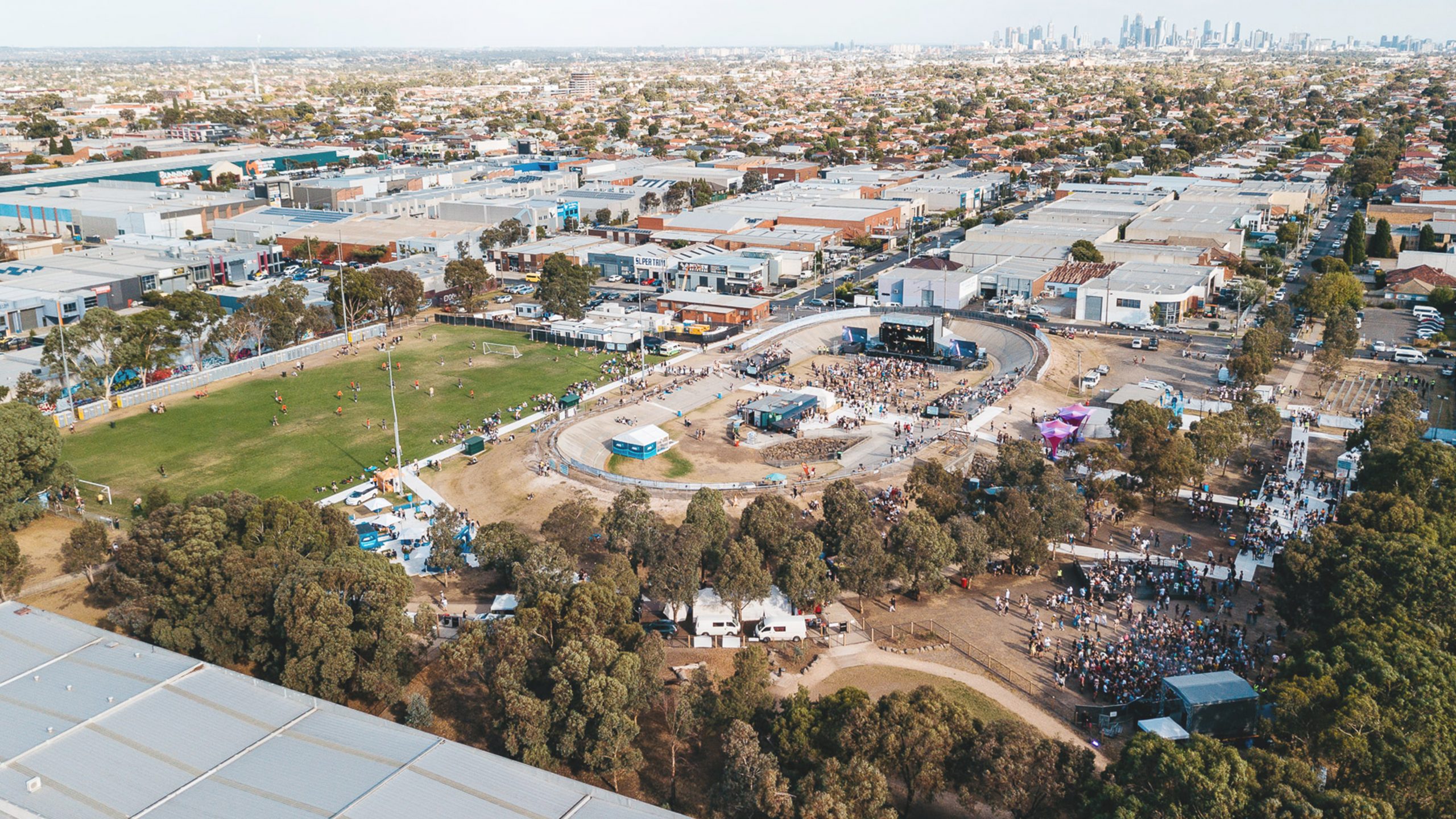
The perfect music festival location creates unforgettable memories, showcases unique landmarks and beautiful natural environments. Along with giving attendees an opportunity to explore new spaces and the historical significance of local sites, music festivals transport attendees on an idyllic journey that is safe for all.
The Coburg Velodrome is situated at the heart of Coburg North’s industrial district and is Australia’s first concrete velodrome. The stunning Coburg Velodrome and its surrounding Richards Reserve have hosted numerous concerts, charity fundraisers, food festivals and outdoor cinema screenings. Sun Cycle was one of the most recent amazing music festivals held at the Coburg Velodrome.
“The velodrome really spoke to us, and it was a strange opportunity to find a space so unique that hadn’t been used before,” says Mitchell. “The velodrome is really exciting because it’s in an industrial zone and there are big warehouses. It provides a buffer from neighbours and there aren’t many spaces like that in Melbourne. But also it’s a fun space to party – it’s just such a unique space. It’s a joy to activate and to see how it’s grown has been really fulfilling.”
Alongside Coburg Velodrome, the event company has also produced festivals at the Burnley circus site and Duke Street in Abbotsford, and continue to open up unique locations across Melbourne. Velodrome Events and Untitled Group were the masterminds behind Reunion Park, which was created with support from the federal RISE (Restart Investment to Sustain and Expand) fund. The concept for the event was to provide a space where promoters who had been hit hard by COVID could have a subsidised, amazing venue. In producing Reunion Park, the company worked with rock promoters, reggae promoters, dance music promoters, a Ministry of Sound orchestra, performing arts producers, and fringe shows.
“That was one of our career highlights because it’s rare to be able to have such a diverse spread of promoters and also a diverse spread of audiences,” Mitchell enthuses. “To be able to reunite a bunch of people under one roof was a really great example of how amazingly diverse Melbourne is and also how loyal the audience is that across six weeks we have numbers of up to 8,000 for shows week after week. That was pretty inspiring, and it was amazing to work with Ben Thompson who was our booking agent.”
Velodrome Events is passionate about providing platforms, particularly mini festival sites, where artists can perform to 5-10,000 people because they might be too small for a 30,000-person festival, but too big to play in a small band-room. “We’re a Melbourne-centric operation and we haven’t seen anything like what we do necessarily be emulated around the world,” says Mitchell. “We think it’s a very important environment to develop and create, to nurture new talent and give artists the opportunity to find their footing before going into the major festival environment.”
Over the summer, Mitchell and partner Garrath Holt produced a mini open-air festival site called Abbots Yard, which is in Richmond. “That’s a fully open-air venue where we’re hosting some mini festivals starting in Spring after the Winter series,” says Mitchell, “and we see that as a training ground for more emerging promoters to cut their teeth and hopefully develop into one day hosting 10,000-person shows themselves.”
Community
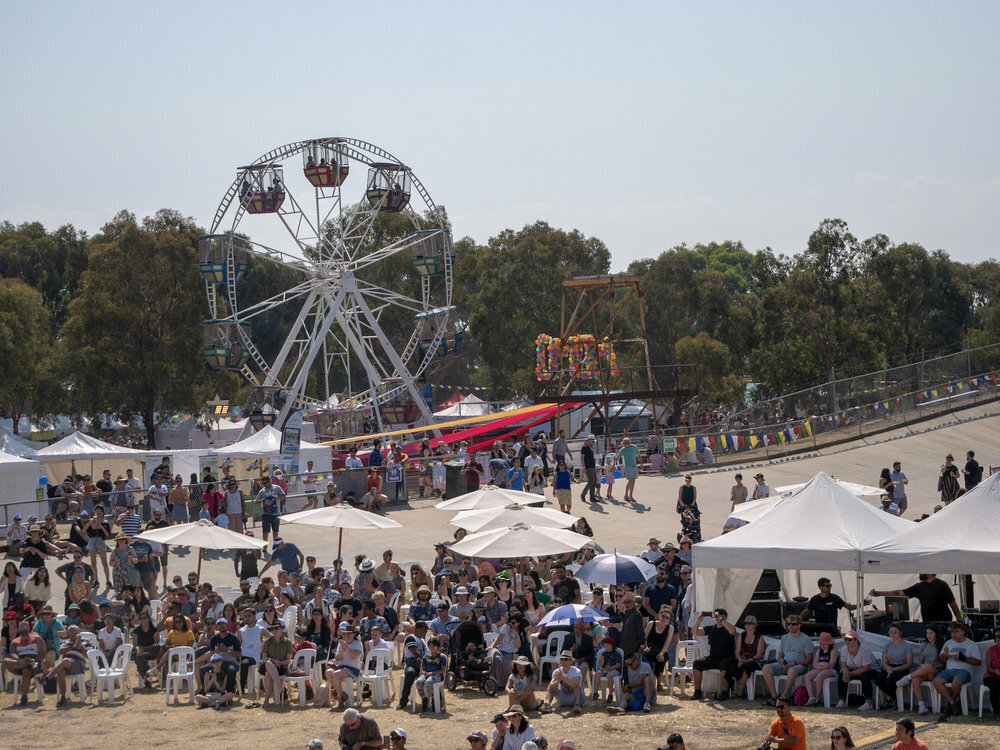
The best music festivals listen to and understand the peoples within their community through working with councils and local organisations to meet the needs of the whole community. Festival attendees feel united not only through their love of music and the arts, but through cultural engagement, community spirit, and support of social and humanitarian causes.
One of the most impressive major cultural events held at the Coburg Velodrome was Momo Fest – a Nepalese dumpling festival – which saw 20,000 people attend on a single day and raised money for earthquake relief in Nepal. “That was a really fun event because you’ve got a really big, diverse cultural community across Melbourne,” says Mitchell, “and being able to work in the community sector was really exciting, with international artists that people hadn’t seen before.”
Every festival is a partnership and comprises an ecosystem involving community, commercial and organisational imperatives. Velodrome Events works closely with a number of councils and non-for -profit organisations across Victoria including the City of Yarra, Coburg Cycling Club, businesses, touring agencies and promoters.
“We curate the promoters as if they were artists themselves, so we make sure we work with the right promoters (Untitled Group and Crown Ruler are ongoing collaborators) who have really good ethics in terms of their reputation within the music industry and their approach to programming things and making sure there’s consideration for inclusivity and sustainability in their programming philosophy,” says Mitchell. “I’ve been in the industry for 20 years and a lot of friends that I started out with are running touring agencies, so you know inherently who you want to work with and what music you want to be responsible for enabling. We want to partner with people who have strong business ethics.”
Solidarity and inspiration
View this post on Instagram
For the director, the solidarity that has arisen within the industry, having gone through the pandemic as a community, has been inspiring. While the pandemic did sadly lead to a lot of people leaving the industry, it has also led to a strengthened solidarity and an increasingly supportive environment in what is traditionally a competitive industry.
“Every single person that’s involved in creating something like this, they generally do it because they love it – they’re really attracted to celebrating music, arts and community and culture,” says Mitchell. “When you book the music, the right people come as a result, and you’re going to have a really good experience and good audience. That’s probably why we’re so selective about who we work with quite often. We’ve learned a lot – there’s been some great steps made. Socially, people are really changing in the past few years, and we make sure we’re across the social changes and social values and they’re implemented when we’re producing a music festival.”
During the pandemic, Velodrome Events worked closely with the Department of Jobs, Precincts and Regions and the Health Department through various consultations devising COVID safety plans for events. The company received a number of grants, including from Creative Victoria and the RISE grant, which were able to provide them with support to launch some new festivals. “At any one time, we had maybe six festivals that were ready to go,” says Mitchell. Despite the hardships, there were positive things gained in terms of communication, including increased communication with patrons prior to an event, patron queuing mechanisms, navigating resources and staffing.
Forward-thinking
Music festivals will continue to evolve and adapt to new circumstances and different political climates. There will be a growth in small to medium-sized festivals and multi-faceted festivals that include events for a broader range of attendees. Lessons gained from experiencing the pandemic indicate that technology can be used to build a more supportive and connected community to ensure that music festivals remain at the forefront of our culture and are delivered safely, inclusively, accessibly and sustainably.
Excited about the year ahead, Mitchell will be making announcements about new developments regarding venue openings and event concepts. “We’ve got some really great announcements about how we’re going about presenting the venues as a collective and promoters we’re working with,” says Mitchell, “so stay tuned – we’ll be making those announcements at the beginning of spring with Summer Camp being our major event to launch the season.” Mitchell has teamed up with Sydney-based promoters Heaps Gay to deliver Summer Camp, which will be the largest LGBTQIA+ ticketed festival in the southern hemisphere. “We’re very excited to be involved in Summer Camp and we’re lucky to be hosting at the beginning of November,” Mitchell enthuses. “It’s got an amazing line-up of artists from the LGBTQIA+ community, including international artists, and those promoters are just amazing to work with.”
There’s a palpable air of excitement about this year’s strong return of festivals and Mitchell states that many will have the opportunity of seeing their favourite international artists this summer.
“Already the calendar’s look pretty amazing with the stuff that’s coming up,” says Mitchell. “Melbourne is such a progressive city. We are in many respects leading the charge in terms of inclusivity, sustainability and those kinds of practices. The Melbourne music and arts industry probably doesn’t get enough credit for how pioneering it is in terms of promoting progressive changes. I think people need to take more notice of what’s happening in Melbourne because they could learn a lot from what we’re doing.”
For more information, visit Coburg Velodrome (velodromeevents.com.au)
This article was made in partnership with Velodrome Events.
